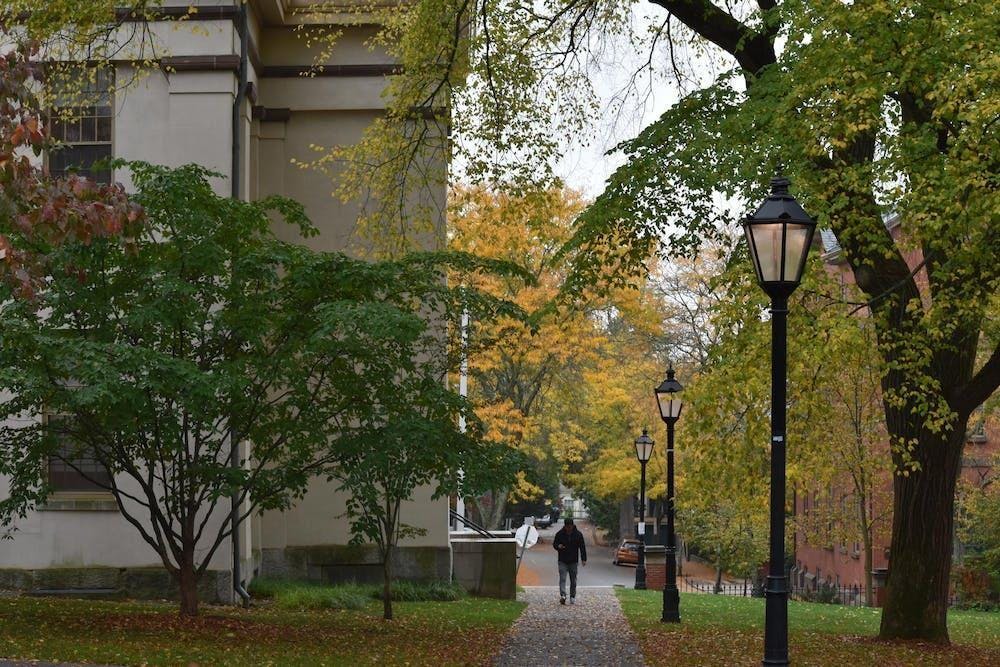President Christina Paxson P’19 P’MD’20 discussed programming for the spring semester regarding Title VI, academic freedom and freedom of expression at Tuesday’s faculty meeting.
Title VI of the Civil Rights Act “prohibits discrimination on the basis of race, color, and national origin in programs and activities receiving federal financial assistance,” according to the Department of Justice. At December’s faculty meeting, Paxson announced that the University would potentially consider “enhancing” its Title VI policy to address discrimination, following a national Dear Colleague letter to many universities on Nov. 7.
Paxson said that the University faces one “Office of Civil Rights complaint based in Title VI,” which the University will address. The Department of Education includes Brown in its list of open Title VI shared ancestry investigations.
With increased reports of antisemitism and Islamophobia across the country, Paxson stated the importance of keeping campus safe.
“We have to care for members of our community who are directly impacted by the events that we’re dealing with,” she said. “We have to support freedom of expression, and some of the programming and events … are around reinforcing our commitment to that principle.”
At the faculty meeting, Paxson also commented on the 19 students participating in a hunger strike in support of divestment before February’s Corporation meeting.
“Our concern is to ensure their health and safety and to (also) make sure that their protest activity doesn’t interfere with the rights of others on campus,” she said, in line with her previous statements on the hunger strike.
Paxson also noted the recent transfer of Title VI and federal investigations to the Office of Equity Compliance and Reporting housed in the Division of Campus Life, The Herald previously reported. Campus Life handles similar issues, including student services and support, she added.
Paxson also expressed the importance of supporting faculty who have fears concerning attacks and negative attention on their scholarship. She directed faculty to a social media guide developed in December and invited faculty to contact General Counsel.
Paxson stated that Brown must “continue with the core work of the University which is to support the great work of our faculty and staff, admitting and educating superb students.”
Paxson also highlighted a new University microsite titled “Strengthening our Community Amid Conflict” to fight racism, discrimination and harassment while promoting on-campus safety, academic freedom and freedom of expression, according to the site’s main page.
The microsite, which was launched on Monday, includes leadership communications, the University’s Title VI response and events and resources regarding bias and freedom of expression.
“Through this series of lectures (and) workshops, we’re going to consider the different ways in which we might cultivate the environment in which we, as a teaching and learning community, can discuss these issues that prompt vigorous debate and very different viewpoints, but do so in a constructive and really inviting, encouraging way,” Provost Francis Doyle said.
Events include a faculty-only meeting focused on the way the endowment is invested and understanding how to think about divestment, led by Jane Dietze, Brown’s Chief Investment Officer, Paxson shared in the meeting.
This spring programming also features a webinar with the American Association of University Professors on March 6, a conversation with Nadine Strossen, former president of the ACLU, on March 14 and a lecture by distinguished lecturer at the Georgetown Law Center, Frederick Lawrence on April 4.
At the meeting, Paxson shared a slide that included an event entitled “A conversation with Jonathan Greenblatt, CEO of Anti-Defamation League, moderated by Professor Wendy Schiller,” which drew concern from some faculty members.
Greenblatt has previously likened anti-Zionism to white supremacy, which concerned some faculty members. Elias Muhanna, associate professor of comparative literature and history, said that he was “a little bit worried about how this is translating into the atmosphere that we're living in right now,” though he affirmed the importance of debate and discussion in a University setting. Paxson said that she supported “wide ranges of views on campus to debate.”
Most of the events regarding academic freedom address the topic from a broad perspective, which some faculty members did not believe was the best approach.
“I find it important to put this attack or controversy around academic freedom in a specific context,” said Nadje Al-Ali, director of the Center for Middle East Studies and professor of international studies, anthropology and Middle East studies. “I don't think that academic freedom per se is what is under attack. It’s academic freedom in the context of very specific issues.”
“To address the issues, sometimes it's good to pull it up out of the specifics and (agree) with people that academic freedom matters,” Paxson responded. “You can bring it back down and say, ‘Okay, we’ve developed the principles—how do they apply to this situation?’” she added. “That's my approach to this, and I hope it is fruitful.”

Ryan Doherty is the managing editor of digital content and vice president of The Herald's 135th editorial board. He is a junior from Carmel, NY who is concentrating in chemistry and economics. He previously served as a university news and science & research editor, covering faculty and higher education.
Cate Latimer is a university news editor covering faculty, University Hall and higher education. She is from Portland, OR, and studies English and Urban Studies. In her free time, you can find her playing ultimate frisbee or rewatching episodes of Parks and Rec.





